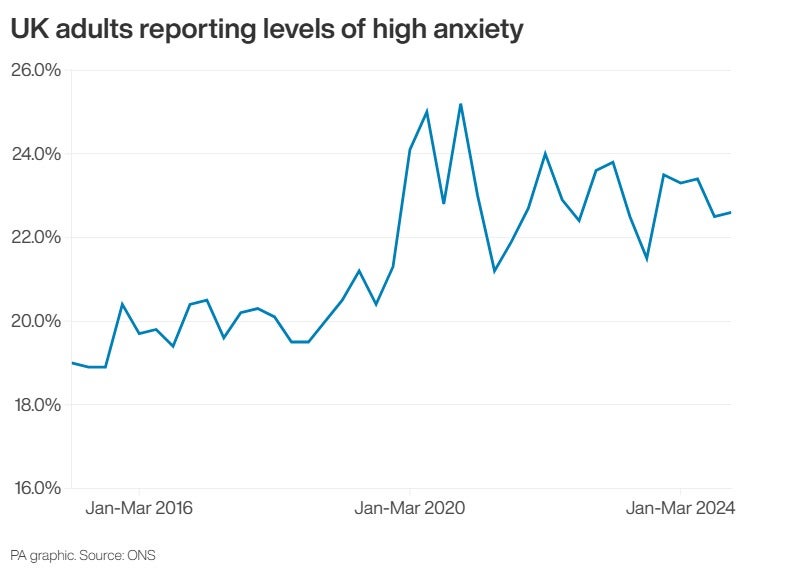
New figures suggest that levels of anxiety among adults in the UK remain higher than before the Covid-19 pandemic.
According to the Office for National Statistics (ONS), 22.6 per cent of people questioned between October and December 2024 reported experiencing high anxiety levels.
This figure is higher than at any point between 2015 and 2019, when the proportion never rose above 21.3 per cent, and sometimes dipped as low as 18.9 per cent.
In the five years from 2020 to 2024, the figure has ranged from a high of 25.2 per cent in October-December 2020 to a low of 21.2 per cent in April-June 2021. The peak of 25.2 per cent coincided with the start of the second wave of Covid-19, while the low coincided with the roll-out of the first vaccines.

The ONS has carried out a survey of wellbeing in the UK since 2011.
The quarterly survey is based on four measures: anxiety; happiness; satisfaction with life; and feeling things in life are worthwhile.
Some 8.5 per cent of adults surveyed in the most recent quarter (October-December 2024) reported low levels of happiness, while 5.3 per cent said they had a low satisfaction with life.
Both these figures were broadly unchanged on levels before the pandemic.
The proportion of women (26.2 per cent) reporting high levels of anxiety in the latest quarter was “statistically significantly higher” than for men (18.8 per cent), the ONS said.
Among age groups, 50-54 year-olds had the highest level of anxiety (25.5 per cent) while 80-84 year-olds had the lowest (18.8 per cent).
What is anxiety – and how to manage it
Anxiety is a a feeling of worry, tenseness or fear, particularly related to things which we think may happen in the future.
It is something most people will feel in their lives, but it can become a mental health problem when it impacts a person’s ability to lead a normal life.
Some people will have specific anxiety disorders, most commonly generalised anxiety disorder. But there are disorders related to socialising, panic attacks, health and more.
These can be cause to seek professional help, with treatments including talking therapies and sometimes medication. However, in most cases people experiencing anxiety will not have a specific disorder, but naturally will still want to alleviate their feelings.
Mental health charity Mind recommends several ways someone experiencing feelings of anxiety can provide themselves with self-care to manage the feeling.
Firstly, talking to someone you trust may provide immediate relief. Mind advises: “It may be that just having someone listen to you and show they care can help in itself. If you aren't able to open up to someone close to you, you could call the Samaritans.”
Trying to manage the worries that are causing the anxiety can also help. This could be by setting aside a certain time to think about them, or writing them down.
Maintaining physical health is also important, ensuring you take normal steps to keep up a healthy diet, exercise and sleep. When feelings become intense, steady breathing exercises can also provide immediate relief.
Proportion of adults with high anxiety is greater than before pandemic
Starling Bank profits slide after FCA fine and Covid loan issues
RFK Jr drops Covid vaccines for pregnant women and healthy children from CDC list
Sandi Toksvig and Gina Miller hoping to become first female Cambridge chancellor







